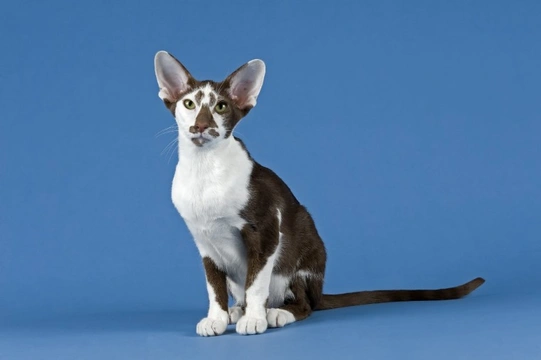
Oriental Shorthair Cat Breed: 10 Things to Know
The oriental cat or oriental shorthair is an exotic and very handsome cat breed that is eye catching, distinctive, and very appealing to a lot of prospective owners.
This is a breed that is closely related to the better known and more widely owned Siamese, and there are a number of similarities between the two breeds in terms of both appearance and temperament as a result.
The oriental cat’s appearance itself is unmistakable and very unlike that of the average domestic moggy, and this can be quite polarising between those who appreciate this trait and those who dislike it; the breed’s personality too is very different to that of moggies, and anyone considering buying an oriental cat needs to ensure they’re clear about this as well.
If you are thinking of buying an oriental cat, it is vital to find out everything you might need to know about the breed as a whole first, to ensure you don’t find yourself with a cat that isn’t the right fit for you after it is too late.
With this in mind, this article will tell you ten things you need to know about the oriental cat before you buy one, to get you started with your research. Read on to learn more.
1. The oriental cat breed was developed from the Siamese
The oriental cat breed is closely related to the Siamese, and as such, they share a lot of the same physical and temperament traits. However, oriental cats are seen in a much wider and diverse range of coat colours and patterns than the Siamese cat, rather than the Siamese’s distinct colourpoints.
2. Oriental cats have a very distinctive physical appearance
The appearance of the oriental cat is relatively similar in shape and build to the Siamese, and quite different to that of the domestic moggy. They tend to be lean, slender cats with large pointed ears, triangular faces, and an exotic and typically “oriental” appearance that is quite polarising in terms of whether or not people find it attractive or off-putting!
3. They are a recognised pedigree cat breed with the GCCF
The oriental cat breed is one that is recognised as a pedigree breed with the GCCF or Governing Council of the Cat Fancy. This means that they are eligible for pedigree registration, and cats that are registered in the stud book can enter in GCCF cat shows.
4. Oriental cats are particularly intelligent
Like the Siamese cat breed, oriental cats are fairly intelligent and often, inquisitive and playful, which can result in their frequently getting themselves into sticky situations! They might even be able to learn tricks like “fetch,” although whether they see fit to perform them can be quite variable!
5. They tend to form strong bonds with their owners
Oriental cats are very loyal cats that like the company of their favourite people and that form strong bonds with their owners. They generally have a marked preference for certain people and aren’t afraid to show this, and may be aloof with others, or people they don’t know – although many oriental cats are generally quite keen on attention from people in general!
6. Oriental cats are playful and often, good hunters
The oriental cat breed is playful and inquisitive, and they are often quite keen and competent hunters as a result of this, and tend to be reasonably lively when it suits them, requiring plenty of games and entertainment to keep their mischievous streak occupied!
7. Oriental cats can be quite demanding to own
The oriental cat tends to like a lot of attention when it suits them, and they don’t take well to being left alone for long periods of time or to being ignored. This can make them quite demanding and high maintenance, and this means that they are not a good fit for every prospective owner.
8. Oriental cats are quite vocal with a distinctive meow
The oriental cat tends to be one that is quite vocal, and they often develop a distinct language of different meows that they use to communicate with their owners and other cats that they live with. Like the Siamese cat, the oriental cat has a fairly distinctive sounding meow too, which can be fairly piercing, particularly when it is repetitive!
9. Oriental cat health can be somewhat variable
Oriental cats tend to live on average for anything from 12-15 years, but there can be a reasonable degree of variance across the board and no sure-fire way of guaranteeing lifelong good health.
Oriental cats are associated with a small number of breed-specific health issues too, which any prospective buyer should learn about in detail before committing to a purchase.
10. It is really important to understand that the oriental personality is not like that of moggies
The oriental cat’s personality is unique and very distinct from that of the domestic moggy, and they are certainly not a good fit for everyone. It is really important to understand this before you buy an oriental so that you can know for sure what to expect, and that owning an oriental cat will be the right fit for you.



